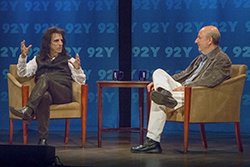Alice Cooper With Anthony DeCurtis, 92Y, NYC, 10.27.14
by Michael Sherer
Posted: Oct 2014
(2780) Page Views

Alice Cooper & Anthony DeCurtis - photo by Joyce Culver
Following a screening of a recent documentary film about Cooper, called ‘Super Duper Alice Cooper’, Anthony DeCurtis and Cooper sat down to talk for a packed house. One of the first questions DeCurtis asked was about the character of Cooper, and where it came from. Cooper, who’s actually named Vince Furnier, explained that most of the performers that he’s been into become someone else on stage. He went on to say that he wanted to be this insane persona that was far removed from the average, simple, American guy that he really was. He secretly wanted to be more like Alice, but never had the nerve.
Initially, The Beatles, but more so the Stones a bit later, planted the seed of what he wanted to do in a rock and roll band. It became clear that a villain type persona was desired, as Furnier saw that his parents hated the more debauched Stones, and that he wanted strong reactions like this. Cooper noted that with his generation being the first to be brought up with television, the medium had an enormous impact. So did black and white horror movies at his local theater in his native Detroit. The most pivotal was called ‘Hell’s A Poppin’, which Furnier saw at ten years old. He said he wanted the insanity of all that, with the schlock element as well, but also the dangerous and scary sides, all in a rock and roll package. Key to this is that it be vaudevillian. He also wanted desperately to be Zorro throughout, which is where his sword came from later. Interestingly, Cooper said it belonged to the one and only Errol Flynn.
Cooper explained that his two favorite bands after maturing some more were The Yardbirds and The Who. His band didn’t have the talent and creativity of either, and needed a producer to pluck from and shape the mess of what they were doing to make the most of it. That task fell on Bob Ezrin, a Canadian that was only in his early twenties at the time. They also needed a clever and driven manager, whom they found in Shep Gordon.
Cooper’s key stage persona quickly evolved, whereby the act of putting on the makeup and outfit, and, especially, seeing and hearing the roar of the audience transformed Vince to Alice. For a very long time, alcohol and later cocaine was often imbibed as part of the ritual, before and after going on stage.
The subject of Cooper’s gradual slide into alcoholism was addressed quite extensively. Once he was able to kick that in ‘77, he then took up cocaine in earnest, which snowballed, no pun intended. It took until ‘83 to kick that, at which point he was frighteningly gaunt and approaching a serious down slide that would have culminated in death. Miraculously, upon deciding it was over, his cravings vanished virtually overnight. They thankfully haven’t returned.
Cooper made clear that he has an addictive personality in general, and that he’s extremely loyal to whatever he becomes addicted to. The positive subjects of his addiction are the music, its show, his wife of 38 years, Sheryl, Gordon, his manager of 46 years, and golf. The mutual respect, loyalty and strong friendship between Cooper & Gordon was discussed as Gordon listened from the audience. (As was Sheryl Cooper, for whom Cooper professed his total love and dependency on.)
DeCurtis posed the issue of how shocking, controversial and demonized the Alice Cooper show was in their heyday of the early ‘70’s. Cooper noted that he and original bassist Dennis Dunaway were journalism majors in college in Phoenix, and that they understood that this would sell tickets and records, which it certainly did. Cooper noted that over the years, especially in the digital age, the shock value/impact has dissipated to the point that virtually nothing on stage can truly shock. Real life far surpasses that, and we can get it all instantly on our digital devices.
As is standard, questions were taken from the audience via cards written on and handed to DeCurtis to ask. One was how old Cooper feels. He replied by saying that at 66, he’s in the best shape of his life. He said he’s not tired after shows, and wonders why.
Another question was what it was like to be a part of the clique group of friends in Los Angeles in ‘74 that consisted of John Lennon, Harry Nilsson and Keith Moon. Cooper explained that they were a drinking club, and were dubbed ‘The Hollywood Vampires’. They met at The Rainbow club every night and drank on its top floor. The highlight for Cooper was seeing what Moon would be wearing. His favorite was his Queen Of England outfit and imitation.
Also asked about was the prevalent groupie scene. Cooper discussed the importance of the GTO’s (Girls together Outrageously) who the band were good friends with. Most importantly though, they introduced the band to Frank Zappa, who went on to sign them to his record label, Bizarre Records.
Soon this bizarre band would be the biggest concert draw in the world, and infuriate legions of parents. Today, Cooper will soon be a grandfather, and is still doing his thing the world over, grateful that he’s alive and even healthy.